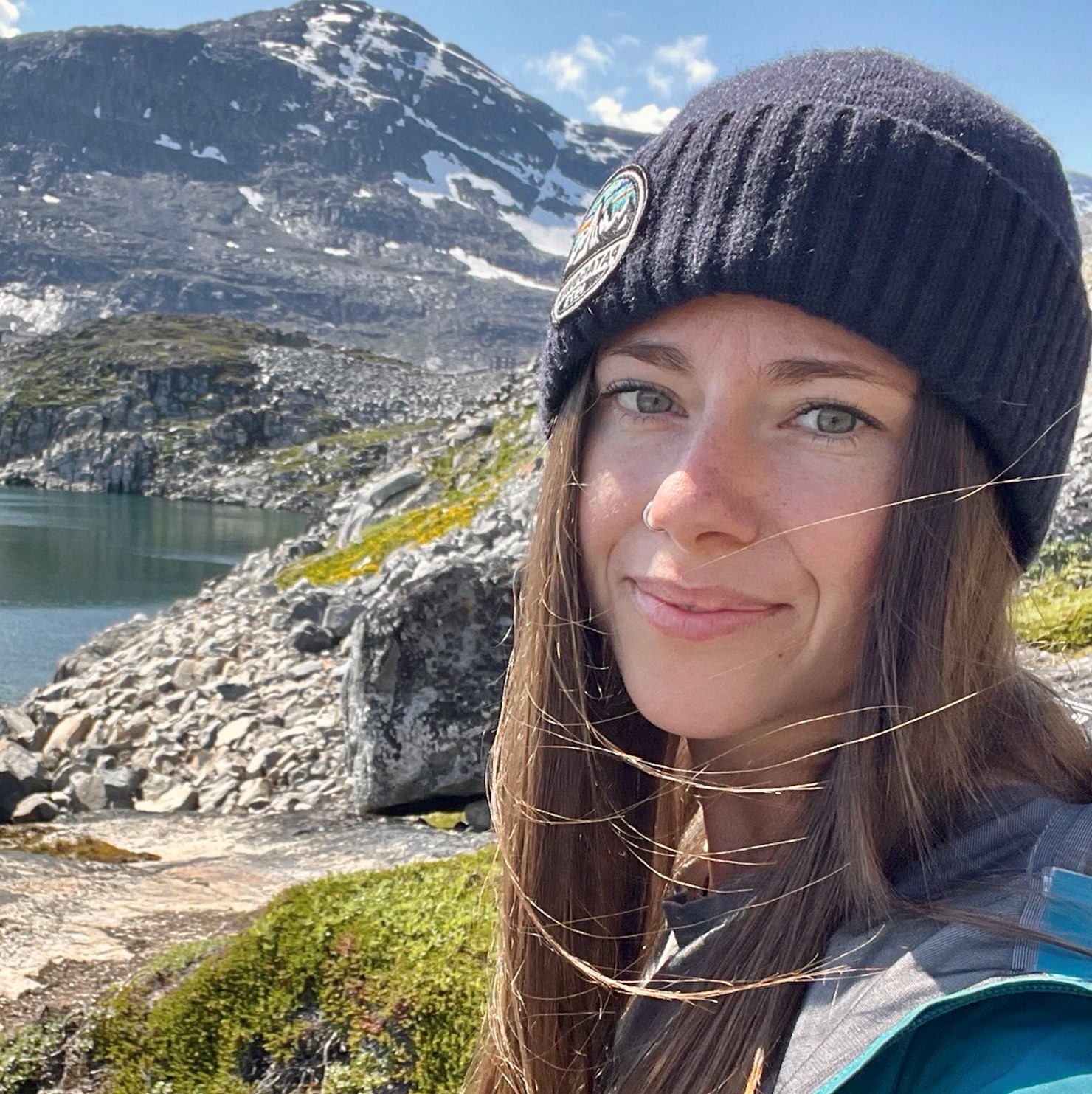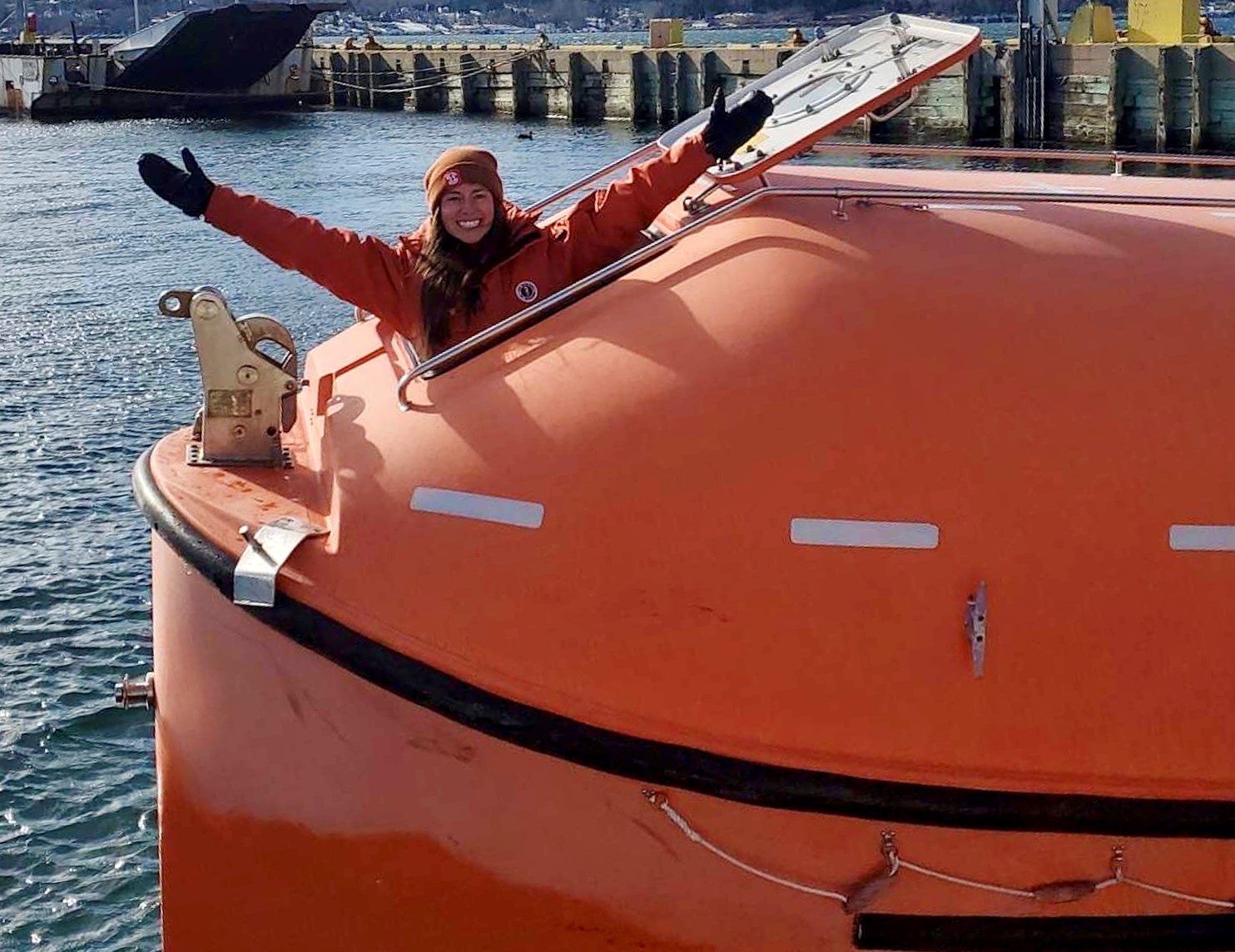In her own words, Morgan Lynch describes her experience as a marine student, why she chose a career in the marine sector, what life is like on a vessel and everything in between.
Morgan in Nuuk, Greenland.
School: Nova Scotia Community College
Area of Study: Marine Navigation Technology
Year of study: Third
Career Goal: Master Mariner Certification
Background: Finance
Interests: Travelling and hiking with her Chihuahua-mix, Louie.
Before working in the marine sector, I worked in the finance industry. I received my Bachelor of Business Administration from University of New Brunswick in 2017, but after a couple of years sitting at a desk, I felt unfulfilled. I had always been fascinated with the ocean so when I heard there was a company in Nova Scotia looking for ‘fishery observers’, I jumped at the opportunity.
I didn’t know exactly what the job entailed at first, or that I’d be so unwanted aboard those ships, but I think their attitudes towards me changed when the fishermen saw how enthused I was to be aboard their vessel. I loved everything about it—the dolphins swimming with the bow, the tuna looking for a free lunch, the camaraderie, the fast pace, the sunrises, even the rough seas.
What led you to pursue a career in the marine sector?
In my early years, I really wanted to be a marine biologist. However, by the time I was graduating from high school, this dream felt unattainable. I had no guidance or reference point as I did not have first-hand knowledge of anyone in the marine industry. My strongest academic inclination was math, which I enjoyed, so instead I pursued a business degree. Eventually I managed to find my way back to where my passion lies—aboard a ship.
But I think a lot of my drive came from sailing with my Dad when I was young, on the Kennebecasis River. Although we never made it past Long Island, this was always the highlight of my summer. The thrill I got from sailing lit a fire in my belly, and a love for being on the water.
What has your experience through the program at NSCC been like?
Morgan in a survival craft in the Strait of Canso, Nova Scotia, which is part of her training at Nova Scotia Community College.
My experience at NSCC has been life changing. My previous academic pursuits were satisfying, but NSCC has far exceeded my learning goals. I’ve had so many interesting experiences and opportunities with this college. Last May, I travelled with NSCC International to Tanzania, where I participated in a social entrepreneurship exchange for two weeks.
And this year, through NSCC’s marine career fair held at my campus, I landed my dream sea placement with Horizon Maritime.
Can you tell me about the vessel you are on now and what your role is?
I am currently on the Horizon Arctic, one of Horizon Maritime’s offshore supply and anchor handling vessels. My role this summer, as a cadet, is to work on deck and gain experience on the bridge. On deck, I work alongside deckhands maintaining the ship. This includes everything from painting the crash rails to mopping the floors. In my day-to-day, I’m often trying my hand at power tools that I had never even heard of—like a needle gun.
Working on the bridge is more technical. This is where I learn the navigation side of things by shadowing the mates. I aid in passage planning, lookout duties, updating charts, operating the radio, administrative work, maintaining navigation equipment, and making coffee. We’re currently in Mexico so I just finalized a passage plan from Altamira, Mexico, to Halifax, Nova Scotia.
What’s the best part of being on a vessel?
The best part of being on a vessel is the excitement of seeing the world from such a unique vantage point. The vast ocean, inlets, and bays that are full of a quiet beauty and at other times a crashing turbulence of wind and waves. Every day is different and offers unique challenges. I love being a part of this adventure and contributing to a team where everyone’s role is essential and valued.
And of course, marine life. Last summer I sailed out of Nuuk, Greenland, and there were several sperm whales swimming right alongside our ship.
What advice do you have for people who are thinking about this type of career?
- Just go for it. Life’s too short and this is a very rewarding and exciting career.
- Go to a marine college in lieu of challenging the exams on your own. The college will hold your hand at every step and make sure you come out of the program with a job. It’s much more difficult to make those employment connections and grasp those intricate concepts when you’re out on your own.
Morgan and her Chihuahua-mix Louie hiking in Mount Mansfield in Vermont.
What are some common misconceptions about mariner life?
A common misconception is that the ocean is no place for a woman. This is a very antiquated way of thinking, a hollow sentiment that does not resonate amongst most of today’s seafarers. I’ve been met with nothing but kindness and good mentorship from the men I’ve sailed with. I hope to encourage more women to join the industry, as more companies are trying to diversify their crew.
What is your ultimate career goal?
My ultimate career goal is to become a Master Mariner… Captain Morgan. I’d love to work alongside scientists aboard research vessels—whether it be tagging fish, mapping out the ocean floor, analyzing the effects of climate change, or exploring parts largely unknown.


